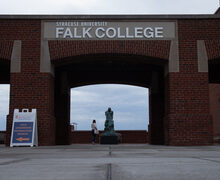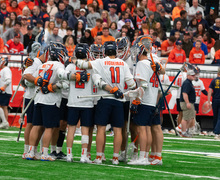Presidential debates should include more than just 2 candidates
While the first debate between Barack Obama and Mitt Romney helped inform voters of the two leaders’ opinions about domestic policy, the debate failed to fully inform voters about their range of options this election. The debate excluded the other candidates running for president.
If Americans want true democracy, debate should include third-party candidates who are running for office. College students, as new voters, should research all the candidates — not just the two main ones.
Most slightly engaged Americans know Obama and Romney. Few know Jill Stein, Gary Johnson, Virgil Goode or Rocky Anderson. These four individuals are all running for the same office as Romney and Obama, but they are seldom covered by the media.
Americans like thinking their country is the most free and most democratic. When the electorate is only presented with two main parties to choose from, it is hardly democratic and not at all free. A lesser-of-two-evils approach to voting and governance seems to be unbeneficial for society as a whole. Third parties need to be viable alternatives.
The candidates representing a third party are not running campaigns based on large donations. Running for office should not require a vast amount of money. Obama and Romney have raised over $600 million each, The New York Times reported.
Third-party candidates have raised only a small fraction. Johnson has raised almost $2 million; Stein has not even raised $500,000, according to the Center for Responsive Politics. They are running based on the quality of their ideas — not their money. Americans should be considering the quality of the candidates’ ideas alone. But, the electorate only considers two parties.
For long enough, we’ve been exposed to the Democratic and Republican visions for our country. We have yet to try something different. Letting the rest of the candidates debate the two major parties’ offerings can potentially force the Democrats and Republicans to become more accountable.
Some of this stems from our political system, which encourages the formation of two main parties. Since we have a system which requires a candidate win a majority of votes, there is an incentive to have only two parties. Democrats and Republicans absorb some of the fringe and extreme viewpoints, and they become more watered down.
America’s range of candidates and parties is vastly different from other, more democratic countries. The Netherlands has 11 parties represented in the House and Senate, alone. There are even more parties who compete and are not currently in the legislature. They have a proportional representation system, whereby the percentage of votes for a party determines the share of seats the party gets in the legislature.
Throughout history, America has had only a few major third-party candidates. The few who gain some support are labeled as “election spoilers.” The most recent example was Ralph Nader, who was criticized for “stealing” the election from Al Gore in 2000.
Voters — college students in particular — should take the time to research all candidates running for office. It is their duty as informed voters and good citizens. The Internet makes finding out about candidates even easier. There is no excuse for a voter to be unable to explain — in specifics — why he or she is voting for a candidate, and why the rest of the candidates are not suitable for office.
The Commission on Presidential Debates — the organizer of all this year’s presidential debates — says it tries to establish debates to educate voters and “provide the best possible information to viewers and listeners.” Leaving out the other candidates running for office does nothing but a disservice to voters and to our democracy.
We have to consider who has been left off the debate stage.
Harmen Rockler is a senior newspaper journalism and political science major. His column appears weekly. He can be reached at [email protected] or followed on Twitter at @LeftofBoston.
Published on October 8, 2012 at 1:00 am




